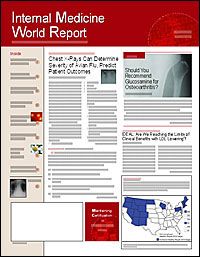Publication
Article
Internal Medicine World Report
Testosterone Replacement Therapy Beneficial for men With Alzheimer's Disease
Author(s):
LOS ANGELES?Testosterone re?placement therapy significantly im?proves the overall quality of life (QOL) of men with mild-to-moderate Alzheimer's ?disease (AD), according to a new study published in the Archives of Neurology (2006;63:[doi:10.1001/archneur.63.2.nct50002]).
The finding mirrors results from previous epidemiologic studies showing that estrogen replacement therapy decreases the risk and delays the onset of AD in postmenopausal women.
In the present study, Po H. Lu, PsyD, and colleagues, University of California, San Francisco, randomized 16 men with mild-to-moderate AD and 22 age-matched male ?con?trols to testosterone treatment or placebo for 24 weeks. None of the patien?ts had evidence of non-AD neurologic illness or urologic or prostate disease.
Testosterone was pro?vided in the form of 1% hydro?alcoholic dermal gel. Patients applied 75 mg of testosterone (3 packets of 25 mg) to 3 different sites each morning after showering or bathing.
Outcomes included cognitive functioning, determined by the Alzheimer's Disease Assessment Scale-Cognitive Subscale, and other parameters, determined by the Neuropsychiatric Inven?tory and Beck Depression In??ven????tory. Global functioning was measured by the Clinician's Interview-Based Impression of Change, and QOL was determined by using the Quality of Life-Alzheimer's Disease (QOL-AD) scale .
At 24 weeks, the testosterone and placebo groups did not differ significantly on any of the cognitive variables within the AD and control groups. Scores on the Developmental Test of Visual?Motor Integration, a constructional task that integrates perceptual activity with motor response, decreased significantly in placebo recipients with AD, remained stable in testosterone recipients with AD and controls who received placebo, and improved significantly in testosterone-treated controls.
Testosterone use produced no significant changes in neuropsychiatric symptom scores in those with AD. The ?number of testosterone-treated patients with AD and mild neuropsychiatric symptoms decreased during the study, but the difference did not achieve statistical significance.
At 24 weeks, patients with AD treated with testo ter?one had significantly higher scores on the caregiver version of the QOL-AD scale than those who re?ceiv?ed placebo (P?= .01).
In the control ?gr?oup, self-rated QOL-AD scores re?mained at baseline levels in the testosterone group and?decreased in the placebo group. The mean reduction in self-rated QOL-AD scores in the control group members who ?re?ceived placebo was not significant.
In AD patients, significant inverse relationships were observed between improvement on performance of measures of visual/spatial functions and baseline levels of free testosterone, dihydrotestosterone, and estradiol.
The findings are consistent with ?previous evidence that the benefits of testosterone therapy may be greater in more severely androgen-?deficient men, the investigators noted. "For men with ?compromised quality of life, as reflected on the type of measure employed in this study, and who suffer from low serum testosterone levels, testosterone therapy may be a reasonable consider?ation," they wrote.





